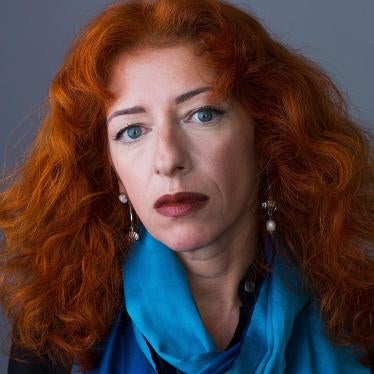The court of grave crimes in Baku found leading Azeri activists, 59-year-old Leyla Yunus and her 60-year-old husband, Arif, guilty of swindling and tax evasion yesterday, and sentenced them to eight and seven-and-a-half years in prison respectively. I was in that courtroom as the verdict was read, and when the judge announced the sentence my first thought was that this was actually a death sentence. They are so ill and frail, several years in prison will surely kill them.
I remember Leyla Yunus from numerous international conferences – a handsome, middle-aged woman with a proud bearing. The woman sitting in the glass cage not far from me was a shadow of her former self, emaciated, worn out, her face pale and yellow. I could not see her husband as Arif Yunus was unable to sit up. He spent that 90 minutes that the verdict was being read out lying on a bench in the glass case, with his head cradled on his wife’s lap.
The crowded courtroom was growing increasing stifling as the air-conditioner could not cope with mid-August heat. Leyla Yunus was fanning her husband, leaning close to him, whispering to him. It was clear she was paying no attention to the proceedings and was completely focused on her husband, who had collapsed twice during closing arguments.
When the verdict and sentence were finally delivered, she called to me: “Arif is in a very bad condition. His health has deteriorated so, he doesn’t even understand what’s happening.”
Arif Yunus suffers from hypertension and recently had two strokes. Leyla Yunus has diabetes and hepatitis C. The health of both Yunuses has gravely deteriorated over the year they’ve already spent in custody.
I wasn’t there to witness Arif Yunus collapsing in the courtroom. The guards would not let me in when the hearing started yesterday morning – just like they wouldn’t let in the media, observers from local and international rights groups and French and Norwegian diplomats who showed up bright and early and crowded by the doors of the court building.
By the time I was admitted the judge was droning on about “unregistered” grants, unpaid taxes, forged signatures, misappropropriated and embezzled funds of foreign donors, and property purchased abroad, allegedly with that money.
The word “Armenia” and “trips to Armenia” were mentioned repeatedly. The Yunuses are also being investigated for high treason and spying in the interests ofArmenia, and could be tried separately on those charges.
Azerbaijan and Armenia fought a seven-year war over Nagorno-Karabakh, a primarily ethnic Armenian-populated autonomous enclave in Azerbaijan. Despite a 1994 ceasefire, the conflict has not yet reached a political solution. The references to Armenia do not seem accidental – it appears that the authorities aim to demonise the Yunuses by portraying them not only as swindlers but also as enemies of the nation. No wonder that Leyla Yunus, in her last statement, described the proceedings as reminiscent of Soviet repression.
It is clear why no journalists were allowed in the courtroom and officials were so adamant that diplomats and international observers had to give up their cellphones and cameras.
The officials did not want the public to see how sick and broken those supposed enemies were, and how much of a mockery of justice the trial was.
No one who saw the couple in their glass cage could help but be shocked by their condition. And could not help but see them as victims of the political manipulation of justice - independent activists punished for their work.
They also appear to have been punished for bringing the international community’s attention to the plight of dozens of political prisoners in Azerbaijan, where over the past three years the government has been relentlessly harassing, intimidating, and throwing behind bars leading human rights defenders, opposition politicians, journalists, and bloggers.
No matter what technical and legalistic pretexts the authorities are now using to lock up and destroy the Yunuses, one glance into that courtroom leaves you with no shadow of a doubt – this is a political trial and the supposed perpetrators are in fact victims of a vicious repression campaign against independent critics.
Tanya Lokshina is the Russia programme director for Human Rights Watch








